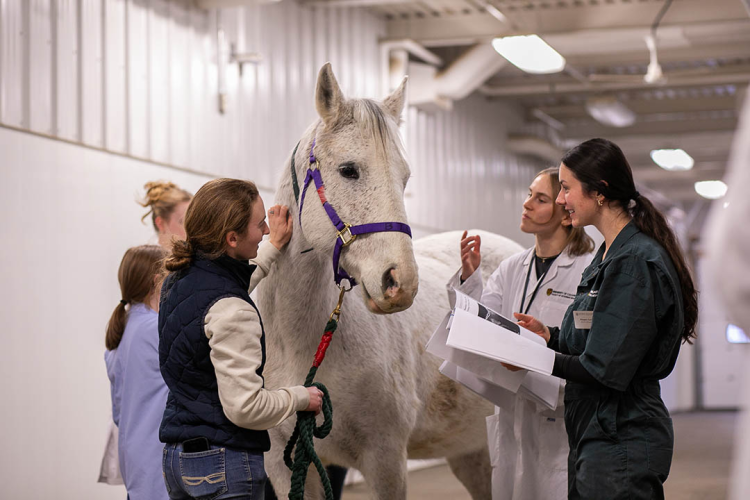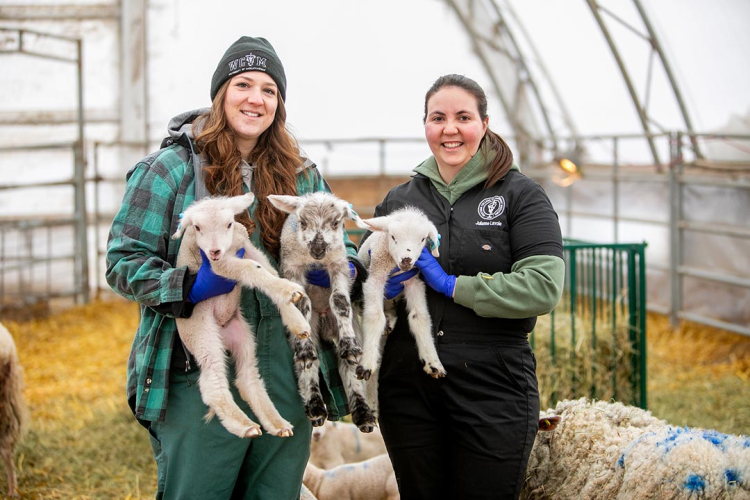As the Western College of Veterinary Medicine (WCVM) celebrates its 60th year in 2025, the regional veterinary college looks ahead to meet the changing needs of its provincial partners and stakeholders across Western Canada and the North.
Last fall, four Western College of Veterinary Medicine (WCVM) veterinary students had a chance to compare notes with four alumni from the Class of 1969 the WCVM's very first class during a panel discussion at Vetavision, the college's public open house.

Dr. Laura Callaghan (DVM), a WCVM equine clinical intern, answers students' questions during an equine lab at the Students of the Canadian Veterinary Medical Association Symposium in January 2025. (Photo: Christina Weese)
While both former and current WCVM students shared common interests in animals and animal health, the conversation also reflected how much the veterinary profession has dramatically changed since the college's first class of students began their studies in 1965.

Dr. Gillian Muir (DVM, PhD) is the dean of the Western College of Veterinary Medicine and a graduate from the Class of 1988. (Photo: Myrna MacDonald)
In the mid-1960s, Canada's four western provinces pulled together to establish a regional veterinary college based at the University of Saskatchewan (USask) campus in response to a severe shortage of veterinarians across the West a dilemma that was especially hard on the region's livestock producers.
"Sixty years ago, our students were expected to graduate and practise in Western Canada at vet clinics that mainly served livestock producers with some small animal work on the side," said Dr. Gillian Muir (DVM, PhD), dean and a 1988 graduate of the WCVM.
"It's a different story for today's graduates. While more than 80 per cent of our graduates still live and work in Western Canada, there are many more career options available to our students in private practice, public service, industry, research, teaching and One Health. The profession's scope as well as the public's expectations of animal health care have changed so much in the last six decades."
New diagnostic technologies, improvements in therapies, advances in animal health research and more veterinary specialities have been key factors influencing the veterinary profession. As well, a shift to larger-scale livestock production, globalization, and a rise in infectious and zoonotic disease have contributed to changes in both animal health and public health. An upsurge in pet ownership, a growing understanding of the human-animal bond, a greater recognition of work-life balance and other societal changes are also causing ripples throughout the profession.
It's a fascinating journey that Muir has been part of for more than 40 years first as a WCVM veterinary student, then as a WCVM faculty member, researcher and department head, and now as the college's first female dean. She's leading a regional veterinary college that has developed into a world-class institution with facilities and programs that continue to address the changing needs of its stakeholders.
In addition to its Doctor of Veterinary Medicine (DVM) degree program, the college operates the WCVM Veterinary Medical Centre a full-service veterinary teaching hospital that serves as both a primary care and referral hub for veterinarians and animal owners across Western Canada. The WCVM is also known for its robust and wide-ranging research program that generated more than $14.4 million in new funding in the 2023/24 academic year. During that same period, the WCVM invested $4.2 million to support undergraduate and graduate student training and research activities based at the college.
A major part of Muir's role as dean is to ensure that the WCVM's education, research and clinical programs grow and adapt to the changing needs of its three provincial partners Saskatchewan, Manitoba and British Columbia as well as its stakeholders across Western Canada and the North.
Since becoming dean in 2020, Muir has visited alumni and industry representatives in communities throughout the West and Yukon. In 2023, she also travelled to Australia and New Zealand as part of a six-week leave during which she visited veterinary schools and WCVM graduates in the two countries.
"It's critical for us to meet and listen to our provincial funding partners, alumni, livestock producers, animal owners and other stakeholders in the profession across Canada and in other parts of the world to understand and prepare for what's coming in the next five to 10 years let alone what could happen in the next six weeks," said Muir.
For the WCVM, one major change was the recent renewal of its four-year DVM curriculum. The revised program incorporates competency-based veterinary education an approach modelled on human medical education that has been adopted by veterinary colleges throughout North America.
Members of the Class of 2024 were the first students to experience all four years of the revamped curriculum, which includes more entry-level clinical skills and integrated use of simulation models as well as additional courses in areas such as professional skills and veterinary business. Many of these changes were based on feedback gathered through regular surveys of the college's new graduates as well as recent alumni and employers of WCVM graduates.
The WCVM has also taken steps to address the current shortage of veterinarians across Canada. Several years ago, the college increased the class size for its DVM program from 78 to 88 seats the maximum capacity for its current facilities and resources. In addition, the WCVM is exploring a potential expansion and renewal project that would allow the college to accept even more veterinary students in the future.
As part of the expansion planning, the WCVM and the Canadian Veterinary Medical Association are investigating the option of developing permanent clinical testing and training facilities for the National Examining Board (NEB) program's two practical examinations at the WCVM the only Canadian site to administer these exams in English.
Muir said this piece of the expansion puzzle has gained attention because of the waiting list of internationally trained veterinarians who must pass the NEB's pre-surgical assessment and clinical proficiency exams before becoming licensed to practise in Canada.
"We're again facing a shortage of veterinarians similar to what was happening 60 years ago in Western Canada, but now the circumstances are different," said Muir. "This time we're seeing widespread shortages across the profession. There's a need for more vets in mixed animal practice, small animal practice, regulatory medicine and in specialized disciplines essentially in all aspects of veterinary medicine."
While a significant rise in pet ownership during the COVID-19 pandemic led to more demand for veterinary care nationwide, other societal changes are at play.
For example, there's more appreciation of companion animals as family members and an awareness of the contributions that pets make to people's overall health. Many animal owners are also willing to pay for more specialized animal health care services.

Dr. Tiffany Matejka (DVM) and Dr. Julianne Lavoie (DVM), who graduated from the WCVM in 2024, worked with young lambs during their fourth-year small ruminant neonatal rotation. (Photo: Christina Weese)
"Veterinarians have always understood the important role that animals play in our lives, and this has become more broadly accepted across our society," said Muir. "This in turn has implications for society's expectations of veterinarians, along with many different career paths that are available to our veterinary graduates careers that didn't exist when I was in vet school."
Last fall's Vetavision panel discussion between past and present WCVM students was the perfect preview for the college's 60th anniversary celebrations, which will take place from June 6-7 in Saskatoon. And while anniversaries often encourage people to look back, Muir is of the mindset that this milestone is also the ideal time to consider what's ahead for the veterinary college, its stakeholders and the veterinary profession.
"It's a great opportunity for us to look to the challenges and opportunities that lie ahead for the WCVM," said Muir. "We're celebrating the past but looking to the future."
Visit the "WCVM Turns 60" webpage for more details about the college's 60th anniversary celebrations.













